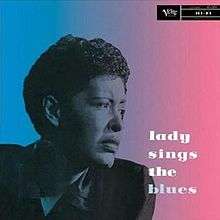Lady Sings the Blues (Billie Holiday album)
Lady Sings the Blues is an album by American jazz vocalist Billie Holiday released in December 1956. It was Holiday's last album released on Clef Records; the following year, the label would be absorbed by Verve Records. Lady Sings the Blues was taken from sessions taped during 1954 and 1956. It was released simultaneously with her ghostwritten autobiography of the same name.
| Lady Sings the Blues | ||||
|---|---|---|---|---|
 | ||||
| Studio album by | ||||
| Released | December 1956[1] | |||
| Recorded | June 6, 7, 1956 New York City, Fine Sound Studios September 3, 1954, Los Angeles, Capitol Studios | |||
| Genre | Jazz | |||
| Label | Clef | |||
| Producer | Norman Granz | |||
| Billie Holiday chronology | ||||
| ||||
| Review scores | |
|---|---|
| Source | Rating |
| AllMusic | |
| Down Beat (1956 Review) | |
| Encyclopedia of Popular Music | |
Content
Taken from sessions taped during 1954–56, Lady Sings the Blues features Holiday backed by tenor saxophonist Paul Quinichette, trumpeter Charlie Shavers, pianist Wynton Kelly, and guitarist Kenny Burrell. Though Holiday's voice had arguably deteriorated by the 1950s, the album is well regarded – in a 1956 review, Down Beat awarded the album 5 out of 5 stars, and had this to say about the co-current book:
Lady Sings The Blues is Billie Holiday's autobiography [...] she tries to get the reader on her side of the mirror, so don't expect a three-dimensional view of the subject. The book was written with William Dufty, assistant to the editor of the New York Post [...] Seldom in the book does she talk about her singing[.]
On November 10, 1956, Holiday appeared in concert at Carnegie Hall in front of a sold-out crowd. The show was planned to commemorate the edition of her autobiography, some paragraphs being read during the performance.
Track listing
- Side 1
- "Lady Sings the Blues" (Billie Holiday, Herbie Nichols) - 3:46
- "Trav'lin' Light" (Trummy Young, Jimmy Mundy, Johnny Mercer) - 3:08
- "I Must Have That Man" (Dorothy Fields, Jimmy McHugh) - 3:04
- "Some Other Spring" (Irene Higginbotham, Arthur Herzog, Jr.) - 3:36
- "Strange Fruit" (Lewis Allan) - 3:05
- "No Good Man" (Irene Higginbotham, Sammy Gallop, Dan Fisher) - 3:18
- Side 2
- "God Bless the Child" (Billie Holiday, Arthur Herzog, Jr.) - 4:00
- "Good Morning Heartache" (Irene Higginbotham, Ervin Drake, Dan Fisher) - 3:28
- "Love Me or Leave Me" (Walter Donaldson, Gus Kahn) - 2:38
- "Too Marvelous for Words" (Johnny Mercer, Richard Whiting) - 2:16
- "Willow Weep for Me" (Ann Ronell) - 3:08
- "I Thought About You" (Jimmy Van Heusen, Johnny Mercer) - 2:47
When issued on CD, 3 bonus tracks from the 3 September recording were added:
- "P.S. I Love You" (Gordon Jenkins, Johnny Mercer) - 3:36
- Softly (Eddie Beal, Joe Greene) - 2:55
- Stormy Blues (Billie Holiday) - 3:27
Personnel
- June 6 & 7 1956, Fine Sound Studios, New York City (Tracks 1-8)
- Billie Holiday, vocals
- Paul Quinichette, tenor saxophone
- Charlie Shavers, trumpet
- Tony Scott, clarinet
- Wynton Kelly, piano
- Kenny Burrell, guitar
- Lenny McBrowne, drums
- Aaron Bell, bass
- September 3, 1954, Capitol Studios
- Billie Holiday, vocals
- Willie Smith, alto saxophone
- Harry Edison, trumpet
- Bobby Tucker, piano
- Barney Kessel, guitar
- Chico Hamilton, drums
- Red Callender, bass
References
- "Lady Sings the Blues". The Billboard. The Billboard Publishing Co. 22 December 1956. Retrieved 21 June 2019.
- Larkin, Colin (2007). Encyclopedia of Popular Music (4th ed.). Oxford University Press. ISBN 978-0195313734.
External links
- https://web.archive.org/web/20120225224251/http://www.billieholidaysongs.com/LP_discography.htm Billie Holiday LP discography
- http://www.billieholiday.be/ Billie Holiday songs